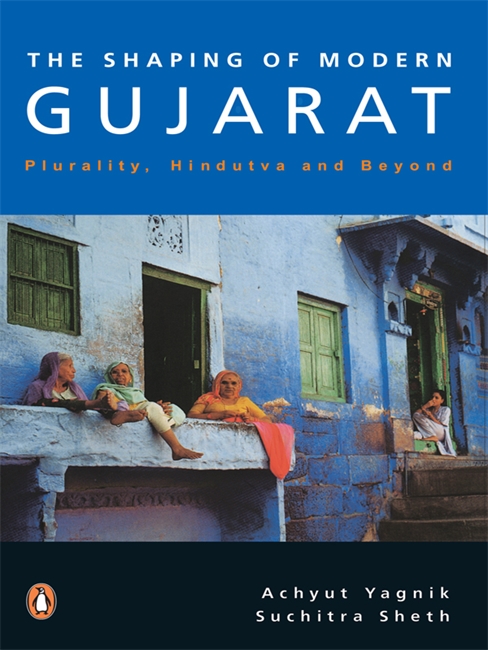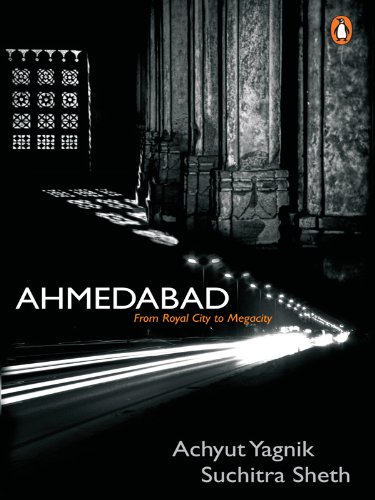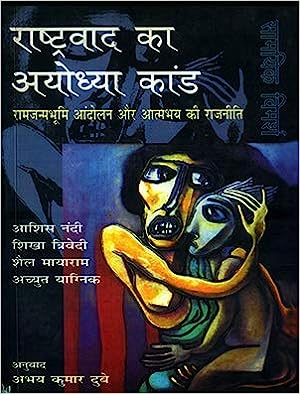If you wanted to know Gujarat, the real Gujarat it was not possible not to have “encountered” Achyut Yagnik.
Outsiders often mistook him for an academician interested in just the socio-political and cultural aspects of Gujarat. But those few who regularly kept in touch with him and later became friends knew that Achyut Yagnik was a storehouse of information. About everything Gujarati. Anthropology, Food, Textiles, Dialects, everything. Alcohol to Automobiles.

Whether you came from Bhavnagar or Berkeley, Harvard or Himmatnagar, this man would treat you with the same hospitality. Endless cups of tea, free smoke(if you wanted) and lots and lots of time.
As a young student of his (he was a visiting faculty and I was interning with him at SETU I later did rural internship with Bela Bhatia at Shramjivi Samaj, Bhiloda), I was amazed at the number of books he had and the variety of visitors he entertained.
Policy analysts, politicians, journalists, researchers, reporters, students and a lot of unemployed idealistic youngsters kept in touch with him. He was then the only ‘adda” place in Ahmedabad. I along with a few others swarmed just to hear him.

Because he is dead, I would not be unfairly kind to him. Because he would hate that. Achyut bhai, who did not like to be addressed any other way, did not believe in anyism except humanism. So, he would be critical and cynical about all politicians he met and mostly those who did not meet him.
I was lucky enough to have been his student. Later, I joined SETU as part of my NGO internship programme under the very able, efficient and compassionate Varsha Bhagat taught me and my colleague Durriya Latif research methodology and interpretation. In the 90’s, SETU published a book on accidental death of women and cause of death in Gujarat. That was the first time we saw what oil burning, resource crunching hard work was. However, when it was published, the credit in black ink gave a fresh high.

Off, I went to Shramjivi Samaj at Bhiloda, this time with a brilliant colleague and already outstanding researcher by then, Mira Desai for a rural internship program. Achyutbhai put us under the committed to the core, supremely well read and globally travel Bela Bhati who taught, to begin with, how to communicate with rural tribal women. Bela became my icon for her commitment to community welfare along with her partner Jean Dreze. Amidst this, Achyutbhai’s focus remained unwavered.
“Tribal Women and Micro Finance” was the area we were working it. After a month,at a personal level, I had not been able to motivate even 3 women to save 25 paisa each. Lesson learnt: (Bookish) knowledge is not power.
That evening, Achyutbhai was at his usual best. There was a dam somewhere near Bhiloda. We lived in slums there but went to some guest house near this dam for a meal. In his absolutely simple anecdotal, simple monologue, Achyutbhai gave us complete gyan about the tribals of Gujarat and their condition. I don’t recall whether I even completed the rural immersion programme or not. But I was disllusioned about formal education tactics.
Achyutbhai’s knowledge about Gujarat was dated back to 990 AD or when the region was Gujjar Pradesh when it was Gujjar Desh. Gurjar Bhoomi in 990 AD was also very vibrant and a trade hub and hence visited by merchants, mercenaries and scholars of all hues. He knew the origin and etymology of every surname and caste. He hated reporters who went to him for a quote or a copy. Sessions with Achyutbhai had to be endless. Because they would be anecdotal, scattered and far flunging. But the learning would be immense. Several writers and activists today and of course journalists owe him much of what they have written. Yours truly included.
What all Achyut Yagnik has written is indisputably the best in contemporary history of Gujarat. Sadly, many have cited his original work written in Gujarati without giving him due credits but Achyutbhai did not really care.
I “saw” Gujarat being the trading centre for the Mughals and the British, the death of the Mahajan, Forbes’ role in Gujarat’s anthropology, the Jains of Amdavad assembling at Sarkhej Roza to welcome the Mughals in turn to get trade facilitation, the freedom movement and the glorious role played by Gandhi, Sardar and others, the princely state issues following independence, the separate statehood for Gujarat movement, the first student inspired and conducted Navnirman Andolan for transparency in political administration, anti reservation stirs, anti Narmada dam, the Ayodhya build up and Babri demolition, the 2002 carnage, the Vibrant Gujarat and the contemporary story all via SETU, his humble office. SETU stood for Centre for Social Knowledge and Action.


For several students like me who forayed into journalism in the 90’s when the internet had not arrived in India, he was our Google. I particularly remember seeking his advice twice. Once, whether I should continue working with DECU, a unit of ISRO or switch over to journalism and then a few years later, whether I should go to England to upgrade my journalism skills or take a hefty promotion and move to another company. In both cases, the advice came after over four months. But the anecdotes, the background stories, the contextual references were all very invaluable. Since he had quit journalism, I was expecting that he would dissuade me. He did not. Ditto with England. Once I came back, I caught up.
Once life takes over, we often lose our basic contacts and connections. Sadly but truly this happened everytime I left India. Thanks to a few common friends, we always reconnected. His son Anand Yagnik now has this tremendous burden to keep up the camaraderie we shared with his wonderful father.
A once upon a time fire brand journalist who changed thoughts on the Narendra Modi government was a close friend of his. Achyut Yagnik did get critical of the journalist’s actions and described it as “ paaltu biladi e paccha patta badlya che” (the domestic cat has again changed stripes) but never did his behaviour towards this journalist change.
For those who would want to know Gujarat, here is a rough reading list of some work done by Achyutbhai
* The shaping of Modern Gujarat: By Achyut Yagnik and Suchitra Sheth (Penguin)
* Ahmedabad from Royal City to Mega city :By Achyut Yagnik and Suchitra Sheth(Penguin)
* Rashtravad Ka Ayodhya Kand by Shail Mayaram and Achyut Yagnik
All throughout his life, he did not align with any political party or agenda. He was happy to live within his modest means. For him richness was having some extra sugar in tea. For him wealth was to buy a new book that he can read and then lend. He would not entertain hypocrites. He would however go all lengths to ensure a poor deserving man got an electricity connection or a government school admission.
Achyut in Sanskrit means firm, the imperishable. It is one of the many names of Lord VIshnu. There are some human beings whose presence inspires us for knowledge. Achyut Yagnik (1946-2023) was one such lovely, enlightened Gujarati. He will be terribly missed by all those who actually read. No, not on Whats App.
Also Read: Surge In Heart Attacks Among Gujarat Youth Linked To COVID















